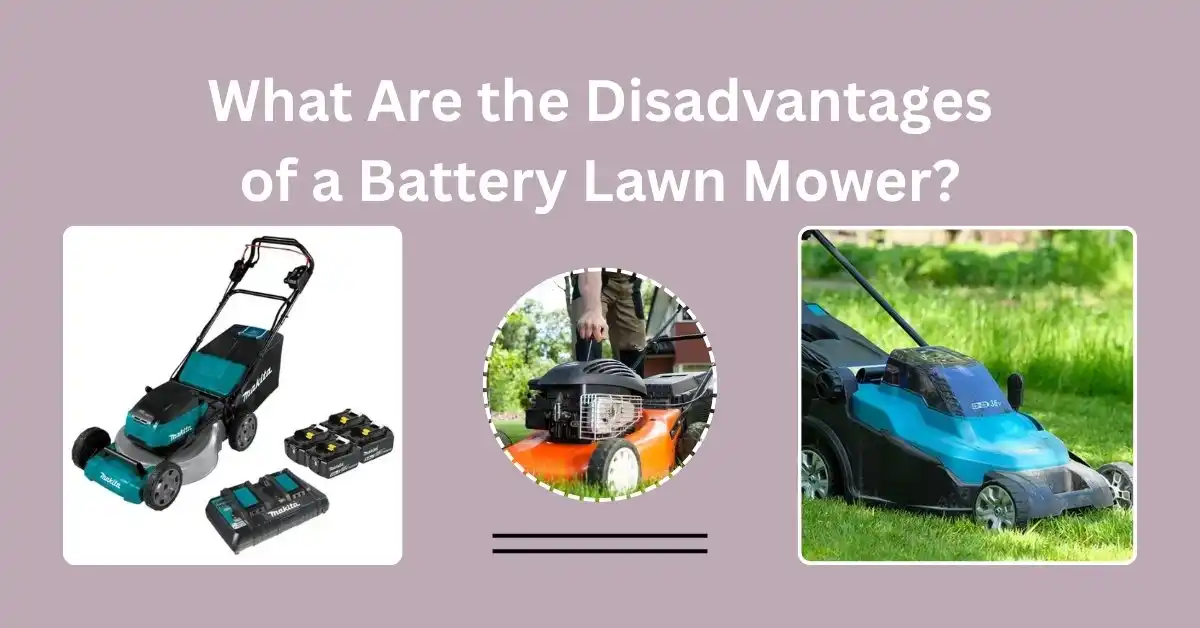What Are the Disadvantages of a Battery Lawn Mower? My Honest Take

Thinking about switching from gas to a battery mower? I was too. At first, it seemed like the perfect move. Clean, quiet, and easy—what could go wrong? But after using one for a while, I found a few problems I didn’t expect. In this post, I’ll share what are the disadvantages of a battery powered lawn mower, based on real use. If you’re thinking about going electric, keep reading—you’ll want to know this first.
What Are the Disadvantages of a Battery Powered Lawn Mower?
Limited Battery Life and Runtime
One time, my mower quit halfway through the lawn. The grass was half-cut, and I had to wait two hours to charge it again. That’s when I knew I had a bad battery lawn mower on my hands.
Most battery mowers run for 30 to 45 minutes. That might sound okay, but not if your yard is big. Charging can take one to three hours. So if you don’t finish in one go, you’re stuck waiting.
Snippet Answer: Battery mowers often run for under an hour and take hours to charge, which makes mowing large yards hard.
Decreasing Battery Performance Over Time
Just like phones and laptops, mower batteries get worse over time. After one season, I noticed mine didn’t last as long. By year two, I had to charge it twice just to finish the job.
What is a major disadvantage of the battery operated lawn mower? The battery fades with time. Most need a new one every 2–3 years.
Snippet Answer: A major downside is the battery gets weaker over time and may need to be replaced every few years.
Replacement Battery Cost
The cost shocked me. I paid almost as much for a new battery as I did for the whole mower. I thought, “Really?” But it’s true.
Wondering how often do you need to replace electric lawn mower battery? Usually every couple of years. My tip: check for third-party brands or off-season deals.
Snippet Answer: Electric mower batteries are costly and often need to be replaced every 2–3 years.
Less Power for Thick or Wet Grass
Thick grass? Forget it. I tried mowing after a rain once, and my mower kept stopping. It couldn’t keep up.
Do battery powered lawn mowers work? Yes, but not always well in heavy or wet grass. Gas mowers still win for raw power.
Snippet Answer: Battery mowers work, but many struggle with thick or wet grass due to lower power.
Charging Hassles and Downtime
I’ve lost count of how many times I forgot to charge the battery. I’d get ready to mow—and then remember it was dead.
Charging can take a while. And if you don’t have a spare, you’re stuck. These battery powered lawn mower problems are real.
Snippet Answer: One big problem is charging time. Without a spare battery, you may have to wait hours to mow again.
Pros and Cons of Battery Powered Lawn Mowers (Quick Look)
Not sure if a battery mower is right for you? Here’s a quick list based on my own use. It’s the good and the bad, side by side.
| Pros | Cons |
| Very quiet | Runs for less than 1 hour |
| No gas or oil mess | Takes hours to charge |
| Push-button start | May stall in thick or wet grass |
| Light and easy to move | Battery weakens in 2–3 years |
| Less upkeep than gas mowers | New battery costs a lot |
| Better for the planet | Easy to forget charging before you mow |
Answer: The pros include quiet use, no fuel mess, and ease of use. The cons are low power, short run time, and costly battery swaps.
These mowers are great for small to mid-size yards. But big lawns or heavy grass? You might hit some bumps. I did too.
Can You Work Around These Disadvantages? Yes—Here’s How I Do It
Battery mowers aren’t perfect—but you can make them work for you. I’ve picked up a few tricks that helped me cut better, stress less, and get the most out of mine.
Keep a Spare Battery Handy
This was a game changer. I bought a second battery, and now I don’t have to stop halfway through a mow. No more waiting hours to finish the job. If one dies, I pop in the other and keep going.
Answer: A spare battery means less downtime and smoother mowing.
Mow in the Morning or Late Afternoon
Batteries hate heat. I found that mowing when it’s cooler—early in the morning or just before sunset—makes a big difference. The mower runs longer, and I don’t feel like I’m roasting on the lawn.
Answer: Cooler temps help your battery last longer and keep you comfortable while mowing.
Clean Your Mower After Each Use
I used to skip this. Big mistake. Grass buildup adds drag and drains power faster. Now, I give the underside a quick brush and wipe down the body. It takes five minutes, but it keeps the mower running smoother.
Answer: A clean mower cuts better, uses less power, and lasts longer.
Do Light Maintenance Often
Check the blade. Tighten loose parts. Keep it dry and stored in the shade. These small things help your mower stay strong. I treat mine like I would a bike or power tool—give it a little care, and it pays off.
Answer: Regular care keeps your battery mower from breaking down too soon.
Bottom line: You can work around most of the downsides. A few simple habits—like charging on time, keeping it clean, and having a spare battery—made my mowing days way easier.
Are Battery Powered Lawn Mowers Worth It Despite the Downsides?
So—after all the quirks, is a battery mower still worth it? Honestly… it depends on you.
If you’ve got a small to medium yard, like mine, and you’re not mowing through a jungle every weekend, then yes—a battery mower can be a solid choice. I love how quiet it is. I can mow early in the morning without waking the whole street. No fuel, no fumes, no yanking a pull cord ‘til my arm hurts. It just works—most of the time.
Answer: For small to mid-size lawns, battery mowers are often worth it for their ease, quietness, and low upkeep.
But if your yard is big, uneven, or filled with thick grass and weeds? You might want to think twice. I’ve had days where I spent more time waiting for the battery to charge than actually mowing. And when that happens, I miss my old gas mower—flaws and all.
Personal truth: These mowers aren’t one-size-fits-all. They shine in certain setups, but fall short in tougher ones.
That’s why I say this: know your yard, know your habits, and then decide. If you’re okay swapping power for convenience, go electric. But if you need muscle, and downtime isn’t an option, stick with gas—or try a corded electric for constant power (just mind the cable!).
Answer: Battery mowers are best for easy-to-maintain yards. They may not suit large, tough lawns due to limited runtime and lower power.
Looking back, I don’t regret my switch. But I had to adjust. I bought a spare battery. I mow smarter—earlier, cleaner, and more regularly. And once I leaned into that rhythm, things got a whole lot smoother.
Bottom line: Battery mowers can be worth it—but only if they match your needs. Don’t fall for the hype. Make an informed call. You’ll thank yourself later.
FAQs
What is a major disadvantage of the battery operated lawn mower?
The battery wears out.
Over time, it holds less charge. After a year or two, it may not last long enough to mow your yard.
Answer: The battery gets weak after a few years and may need a costly swap.
That happened to me. In year two, I had to stop halfway and charge just to finish.
Do battery powered lawn mowers work well on tall grass?
Not really. Mine didn’t.
I tried cutting thick grass once, and it kept stopping. It just didn’t have the power to push through.
Answer: Battery mowers can stall in thick or wet grass. Gas mowers are better for that.
They’re fine for normal grass. But if your lawn grows fast, it can be a pain.
How long does a battery powered lawn mower last?
The mower can last 5–7 years. But the battery? Not so much.
Most last 2–3 years before losing power.
Answer: The mower lasts years, but the battery may need replacing every 2–3 years.
I learned this the hard way. I had to buy a new battery in year three.
Why is my battery powered lawn mower not holding a charge?
The battery may be old.
Or maybe it sat too long in a hot or cold place. That can hurt it too.
Answer: Batteries lose charge with age or if stored in heat or cold.
I store mine indoors now. That helps a lot.
Is it worth buying a battery powered lawn mower for a large yard?
It depends.
If you have a big lawn and no spare battery, it might not work well. Mine died halfway when I first tried.
Answer: For big lawns, battery mowers can work—but only with a spare battery.
Now I keep a backup, and it works much better.
Thinking of switching to battery power? Drop your questions below—I’ll reply!
Read More: Common Reasons Your Electric Lawn Mower Starts and Then Shuts Off
